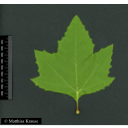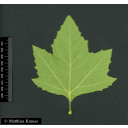Useful information about the taxon (species, subspecies, variety...)
Platanus occidentalis L. 1753
Platanaceae
(APG IV)American sycamore, American plane tree, buttonball tree
Akzessionnummer: LG-S-069-18777
Pflanzjahr: 2008
Patenschaftstext: Für Leon Kilian * 24.02.2017
Taxon concept: The Plant List (2014), version 1.1
Distribution: Southeastern North America
Platanus occidentalis L. - Accepted: Platanus occidentalis L. bei The Plant List (2014), version 1.1; Familie: Platanaceae (APG III)Platanus occidentalis L. - Accepted: Platanus occidentalis L. bei BfN Checklist Flora DE; Familie: Platanaceae (APG IV)
- Flowers
- monoecious species; flowers in pendulous spherical capitate inflorescences
- Flower ecology
- wind-pollinated (anemophilous)
- Life form
- tree
- Foliage persistence
- deciduous
- Fruits
- fruit is a brown aggregate fruit of achenes (nutlets)
- Fruit ecology
- wind- and water-dispersed (anemochorous and hydrochorous)
- Soil conditions
- preferentially on moist, nutrient-rich alluvial soils or sandy loams
- Root type
- forms strongly branched root systems
- Succession type
- pioneer species
- Natural occurrence (habitat)
- stream banks, river floodplains, bottomland forests, elm-ash-cottonwood forests, cottonwood-willow woodlands, shallow swamps, disturbed sites
- Vegetation typ and synecology (plant community)
- temperate, mixed mesophytic deciduous forests
- Constraints according radiation (light)
- intolerant of shade
- Constraints according habitat
- very susceptible to ozone damage
- Life span
- long-lived species (over 250 years)
- Usage
- the wood is used for furniture, interior trim, panelling, boxes, pulp, particle and fibre boards, and to some extent as fuelwood
- Bark
- grey bark
Erhardt, W., Götz, E., Bödeker, N. & Seybold, S. (2008): Der große Zander. Enzyklopädie der Pflanzennamen. Band 2. Arten und Sorten. Eugen Ulmer KG, Stuttgart (Hohenheim), 18. Aufl., 2103 S.; Global Biodiversity Information Facilty (GBIF). Online Publication: www.gbif.org;
Diese Webseite verwendet Google Maps, um Karten und Standorte von Pflanzen in den Hohenheimer Gärten anzuzeigen. Dadurch werden unter Umständen Daten an Google weitergeleitet, was mit einer Verarbeitung Ihrer personenbezogenen Daten verbunden sein kann. Die Datenschutzerklärung von Google finden Sie hier: Datenschutzerklärung von Google


